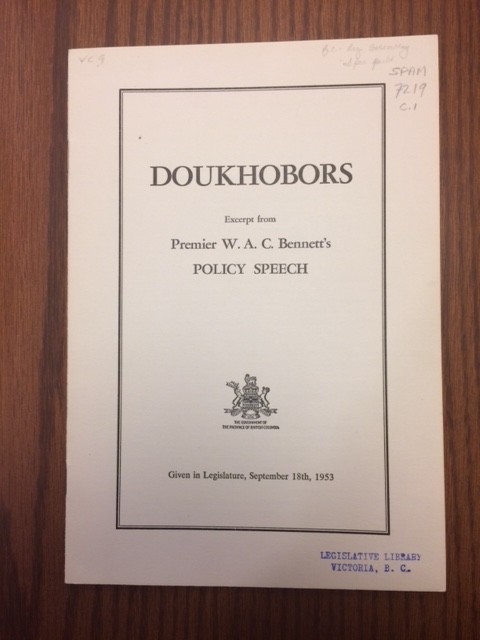Below is a commentary and summary of the content of an excerpt from Premier W.A.C. Bennett’s policy speech, given in the Legislature, September 18th, 1953.
This speech deals primarily with the issue of the controversy in the 1950’s surrounding a small sect of the Doukhobors known as the Sons of Freedom. It begins with a brief account of the Doukhobors who have a history of over 300 years dating back to 1654 in Russia. Being persecuted by the Russian government for their pacifist ways and refusal to bear arms, they consequently sought refuge in Canada with the assistance of Leo Tolstoy. They began immigrating in 1898. When the Doukhobors were admitted to Canada under the Laurier government of 1899, they were granted immunity from serving in the military, a privilege that is still recognized.
The fact that the Doukhobors had “a negative attitude toward all priests and formalisms,” and denied government and church authority, led to the controversy of the 1950’s when the Sons of Freedom Doukhobors “came to represent a problem” (5). This rejection of government and church authorities was not something the Canadian government was unaware of, even when they first sought asylum in Canada. Despite the problems the Doukhobors had with the government in Russia, they were still permitted to immigrate to Canada based on their “good behaviour, diligence, sobriety, and hard-working qualities [that had] brought nothing but prosperity to the barren localities in which they were originally settled” (5).
By 1908, 5,000 Doukhobors had settled in B.C. (5). In 1912, there were 700 school-aged children who had never been to school and who knew little English (5). This, of course, is the issue that started all the controversy. As the leader of the Doukhobors, Peter Verigin stated, “all would have been well within the Doukhobor Empire had the government of the day not interfered by attempting to have the children attend school, and by trying to collect statistics of births, marriages, and deaths” (5). The Doukhobors’ stand on these issues was well known before they were allowed to immigrate to Canada. The government’s problem was specifically with the Sons of Freedom Doukhobors, who were steadfast in their belief of home schooling. In addition, the Sons of Freedom Doukhobors objected to the collection of vital statistics and were against paying rent and taxes on land they occupied, since they did not recognize any form of private ownership of land (5).
One cannot deny that the Sons of Freedom became a cause for concern, but it is a situation that could have been avoided. They wanted to home school their children. This is surely not a crime. It should be noted that the recommendations of the Consultative Committee was not to find a middle ground which all parties could agree upon. Rather, they suggested larger prisons, and the relocation of the Sons of Freedom to Uruguay.
To his credit, Bennett did point out that “the great majority of Doukhobors in Canada and in BC… are law abiding people who are making distinctive and valuable contributions to the development and culture of this country.” He understood it was only a small handful of the entire group who were responsible for “incidents” of rebellion (5). Hence, he continued, it is a “great injustice” not to distinguish between these two groups for it conflates the truth. The fact remains that 90% of Doukhobors in this country have adjusted well to Canadian living (5).
